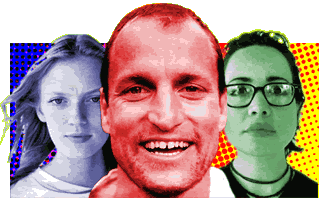
Behold! The anti-celebrities! This relatively new breed of Hollywood star is, at this very moment, appearing in a theater near you. Like normal celebrities, they frequent film festivals and Los Angeles hot spots, and grant interviews to sundry newspapers and magazines. But unlike typical famous actors, who bide their time looking glamorous and extolling the virtues of overpriced Versace garments, this ragtag bunch of famous rebels denounce the industry they are party to and express a self-loathing regard for their profession that is at once sad and admirable.
Anti-celebrities share disdain for all things L.A., which they often express by living elsewhere. Most support a lefty political cause or two. These "indie rebels" prefer edgy art-house roles to mainstream fare, though they're not above playing to the masses. Most importantly, they feel the need to openly flout Hollywood conventions, which dictate that they make nice with the press, glam up in public, and believe in their own ephemeral importance. They are rebels, like James Dean; protestors, like Jane Fonda (now sucked back into the stereotypical fold); communist sympathizers, like Charlie Chaplin. Audiences regard anti-celebrities as cool, hip, and smart -- as opposed to beautiful, glamorous, and lucky.
You want a celebrity? Gwyneth Paltrow is a celebrity. The daughter of Tony-winning actress Blythe Danner and TV producer Bruce Paltrow, Little Miss Gwyneth was born with an Oscar instead of a silver spoon in her mouth. As evidenced by her tearful 1999 Academy Award acceptance speech, she clearly believes in her own fame and tries hard to embody its best qualities: beauty, style, and glamour. In magazine interviews, she displays an uncanny lack of self-awareness, blathering on about her love life, her roles, and her latest look -- never questioning why anyone should care.
Now compare Gwyneth to recently minted anti-celebrity Sarah Polley. Also blonde, beautiful, critically acclaimed, and from an industry family, 20-year-old Polley absolutely cannot make it through a press interview without cursing Los Angeles. She touts her political activism at every turn. When the spotlight on her talents grows too bright, she touchingly responds by questioning her own worth as a human being: "There's a big part of me that always feels like I've somehow failed as a person, and that I'm trying to redeem myself in some way," she told a Canadian publication in September.
Thanks for sharing, Sarah.
While nobody is questioning Polley's sincerity, the anti-celebrity rant is a schtick, like any other. Depending on celebrities' schtick of choice, they may appear on magazines (Sarah Michelle Gellar and Nicole Kidman), rave like a lunatic (Jim Carrey, Nick Nolte), or bitch about people who pose nude on magazines or rave like lunatics (Polley). These exercises in performance art are stars' way of selling themselves to the public. It's necessary to create a personality, because nobody wants to hear about what kind of laundry detergent you use, or any other mundane fact. "Who you are" is a well-rehearsed, smartly orchestrated publicity stunt. Celebrities believe in their personas; anti-celebrities think they don't, but do anyway.
Polley is hardly alone in her anti-celebrityness. Two other notable characters have made names for themselves with their self-defacing image-making: Janeane Garofalo and Woody Harrelson. Janeane wears sweatpants in public, calls herself fat, and bitches at Joan Rivers for calling other celebrities ugly. Woody gets arrested for planting hemp seeds in protest, drinks too much, and owns a restaurant that serves only vegan, non-cooked foodstuffs. This trio's antics, when taken as a whole, form a precise blueprint for anti-celebrity behavior: what to say, what to wear, what to believe in, where to live, and so on.
Jenn Shreve is a freelance writer in San Francisco and a media columnist for Salon.com.Jenn's column runs every other Wednesday on GettingIt.
